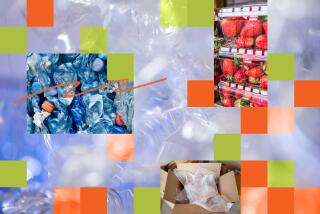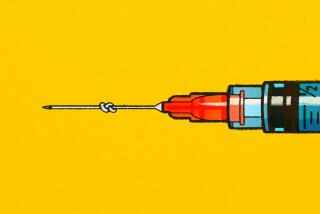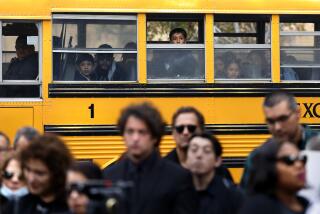If your kid wants skin-care gifts for the holidays, here are some risks to consider

- Share via
As parents rush into malls for the final days of Christmas shopping, many will be armed with wishlists full of beauty products for their children.
Skin care is a fast-growing phenomenon among Gen Alpha, typically defined as those born from 2010 and on. Dubbed “Sephora kids,” the tweens and teens have been buying up products from buzzy brands including Drunk Elephant, Bubble and Glow Recipe and diligently following multistep, antiaging skin-care routines popularized on social media.
With kids becoming a powerful segment of the booming $164-billion global skin-care industry, brands have been catering to them with new products packaged in colorful, eye-catching bottles and jars.
The obsession with skin care among Gen Alpha is leading to a windfall of unexpected business for the booming $164-billion global skin-care industry, which historically has targeted women, not girls
Dermatologists say getting children into the habit of taking care of their skin is a good thing, but they’re urging parents to exercise caution as they splurge on holiday gifts.
“For pediatric dermatology, we always say to be very mindful and wary of active ingredients that are in products,” said Dr. Jayden Galamgam, a pediatric dermatologist at UCLA Health. “A lot of the time, simple is better.”
What products are OK for my kid to use?
A gentle cleanser, a hydrating moisturizer and a good sunscreen are recommended and appropriate for any age.
“You don’t need to be using all these products; you don’t need a 10-step routine,” Galamgam said. “Use three products. Most don’t need anything more than that.”
Look for broad-spectrum sunscreen with an SPF of 30 or higher; it should be worn daily and reapplied every couple of hours.
What products should I avoid?
Anti-wrinkle serums, exfoliants and peels are not appropriate for children. Avoid products containing potent alpha hydroxy acids, beta hydroxy acids and retinol, Galamgam said.
“I would definitely try to stay away from those, because they can cause a lot of irritation for kids,” he said.
Social media trends often encourage tweens to experiment with cosmetics that are inappropriate for their skin type or age, so parents need to look carefully at ingredient labels before buying, said Sam Cutler, founder of Beverly Hills-based tween skin-care brand Petite ’n Pretty.
“We want to caution parents about the growing trend of products marketed as ‘kid-friendly’ due to their bright, playful packaging, which can be misleading,” she said. “Many of these products are formulated for adults and contain harsh ingredients, such as hydroxy acids, retinoids and artificial fragrances, which are too aggressive for young, delicate skin and can cause irritation or long-term damage.”
My kid wants antiaging products anyway. What should I say?
You can talk to them them about the potential harmful side effects, and about the risks of following the advice of online “skinfluencers.”
“There are a lot of teens that are using these products inappropriately due to misinformation or wanting to fit in with their friends based on what they’re seeing on TikTok,” said Dr. Carol Cheng, a pediatric dermatologist and an assistant clinical professor of dermatology at UCLA.
“They’re easily susceptible. A lot of them don’t realize that these influencers are probably being paid to promote certain products.”
Is anything being done to protect kids from potentially harmful skin-care products?
In February, California Assemblymember Alex Lee introduced legislation to ban the sale of antiaging products to kids under the age of 13, but the bill failed to pass in the California Legislature.
More to Read
Inside the business of entertainment
The Wide Shot brings you news, analysis and insights on everything from streaming wars to production — and what it all means for the future.
You may occasionally receive promotional content from the Los Angeles Times.












